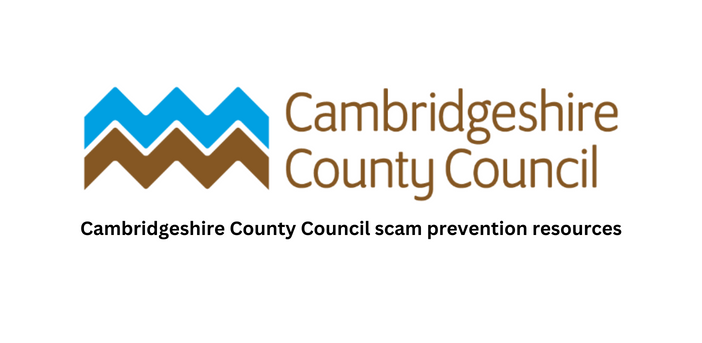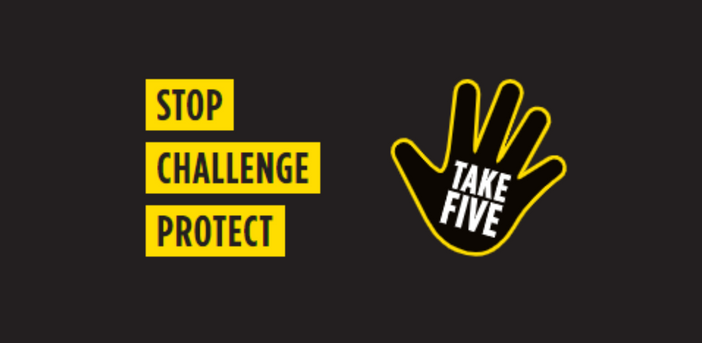Scam Awareness and Prevention

Published on 10 March 2023 10:04 AM
Anyone can be the victim of a scam, as fraudsters find ever more sophisticated ways to target people, by cold call, email, text, or mobile App's such as a Whats App message. Keep informed about the latest scams, and know what to do if you think you have been targeted.
Remember, if you suspect you have been a victim of a scam, contact your bank immediately.
We work in partnership with The Cambridgeshire and Peterborough Against Scams Partnership (CAPASP) to raise awareness of scams and to support victims of scams. We have some trusted partners who share resources on what you can do to recognise and avoid a scam, please see the links below.
According to Action Fraud, 53 per cent of people aged 65 or over have been targeted by scams and criminals. Being a victim of this crime can have devastating impact. Scams take a variety of forms such as: rogue traders, romance scams, scam mail, telephone calls, text messages and emails, pension scams, investment scams.
These crimes are often targeted at people in our communities that are vulnerable for a variety of reasons, including poverty, isolation, frailty, disability and cognitive impairment. However, ANYONE can be a victim of a scam, regardless of age, gender, education or economic background.
How can you help prevent loved ones being scammed?
Criminals often target isolated older people with high pressure letters and telephone calls in an attempt to access their life savings, sometimes their homes with equity release scams. Whilst in some cases the older person’s bank is able to step in and put a halt to things, many still fall foul of these tricks, affecting their ability to fund social care in later life.
The loss of money is only part of the problem. Many victims of scams experience feelings of embarrassment and a loss of confidence which leads them to withdraw from their family and friends. The combined effect is a dramatic worsening of their mental health and often leads to physical decline.
It's therefore incredibly important that family and friends look out for one another in an attempt to spot scams and halt them as early as possible. Some signs that might indicate that someone you know is being scammed:
- Are they receiving or sending lots of post to companies abroad?
- Do they receive lots of phone calls from strangers or companies?
- Are they making frequent visits to the Post Office or the bank?
- Have they gone through a large amount of stamps and cheque books?
- Do they have a number of unpaid bills?
- Are they receiving lots of free gifts through the post?
- Do they frequently receive suspicious letters or flyers?
- Do they appear anxious?
What can you do to help protect your loved ones?
- You can install a call blocker to help halt phone calls from strangers or call centres.
- You can sort through the mail together to help identify scam letters.
- You could help to install "No Junk Mail" signs by the front door.
- You could use the Royal Mail's website to opt out of unaddressed mail.
- You could register with the Mail Preference Service to stop unsolicited mail.
- You could register with the Telephone Preference Service to opt out of unsolicted marketing telephone calls.
- Be aware of Cybercrime and help them to be secure online, protecting their data and devices from hacking, and to recognise scam emails.
- Scammers often look for houses with overgrown gardens or peeling paintwork in an attempt to con older people without a support network of family and friends. You could offer to help maintain the front of the house for a neighbour or relative.
- Perhaps the most important way to protect someone from a scam is to spend time with them - many older people are caught out by these scams simply because they want someone to talk to.
The Little Book Of Phone Scams
See this leaflet to learn about different phone scams and how to protect yourself
To help older people stay safe, the Take Five to Stop Fraud campaign advice is to:
STOP: Taking a moment to stop and think before parting with your money or information could keep you safe.
CHALLENGE: Could it be fake? It’s ok to reject, refuse or ignore any requests. Only criminals will try to rush or panic you.
PROTECT: Contact your bank immediately if you think you’ve fallen for a scam and report it to Action Fraud.
Useful Further Reading
-

-

Take Five-Stop Fraud
Criminals are experts at impersonating people, organisations and the police. They spend hours researching you for their scams, hoping you’ll let your guard down for just a moment. Stop and think. It could protect you and your money.
-

The Bobby Scheme
The Cambridgeshire Bobby Scheme, now in its eighteenth year, has helped in excess of 31,000 older, vulnerable and disabled people who are either the victims of burglary, domestic abuse and other crimes, or who are concerned about home and personal security. We secure the homes of these people with security devices and alarms.
-

-
Authorised Push Payment (APP) Fraud
The latest fraud figures published by UK Finance in October 2022 show that the value of APP scam losses for the first half of the year was £249m. The national charity, Age UK campaign to help older people stay safe from scams.
-
How can I keep my money and information safe from scams?
Help to spot and avoid the latest scams targeting your money.
Stay Safe Online
Link to our page on Cybercrime containing more information
Volunteer For Us
You might be able to prevent a scam, simply by spending time with some one. You can help reduce isolation and loneliness, and support an older person.
